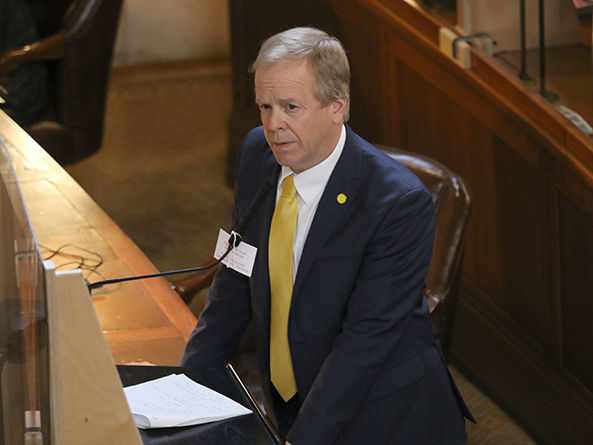Session Review: General Affairs
Senators established casino gaming regulations, permanently legalized to-go alcohol sales authorized during the pandemic and expanded the type of fireworks that can be sold in Nebraska.
Gaming
Lawmakers created a statutory framework for a constitutional amendment approved by voters last November that legalized all forms of games of chance at licensed Nebraska horse racing tracks.
Among other provisions, LB561, introduced by Sen. Tom Briese of Albion:
• allows wagering on sporting events at racetracks in the state;
• prohibits wagering on high school youth sports;
• establishes a system for filing complaints;
• prohibits the use of credit cards to place bets;
• renames the State Racing Commission to the State Racing and Gaming Commission;
• raises the legal age to wager on horse racing from 19 to 21;
• establishes a process for allowing individuals to be excluded voluntarily from wagering; and
• classifies manipulation of a game of chance or gaming machine as a Class I misdemeanor.
LB561 also prohibits betting on Nebraska college teams when they are playing in state and requires that keno played at licensed racetrack casinos operate in accordance with the same state regulations that govern existing keno parlors.
The bill passed on a 44-3 vote and took effect immediately.
LB371, introduced by Grand Island Sen. Raymond Aguilar, also addresses the ballot initiative. Current state law prohibits gambling and a number of other activities within 660 feet of a state, district, county or agricultural fair and provides exceptions.
The bill adds games of chance under the Nebraska Racetrack Gaming Act to the list of exceptions, allowing games of chance at licensed racetracks in Nebraska that are located near fairgrounds to operate at the same time as a fair.
Senators passed the bill on a 35-7 vote.
Alcohol
LB274, introduced by Sen. John Lowe of Kearney, creates a new promotional farmers market special designated license. Under the bill, farm wineries, craft breweries and microdistilleries that currently are licensed to manufacture alcoholic beverages may apply for the SDL, which allows sales at any farmers market for one year, subject to local approval.
Previously, such entities were required to apply for an SDL for each event at which they sold alcohol.
LB274 includes provisions of North Platte Sen. Mike Groene’s LB415 that increase the maximum number of gallons a Nebraska microdistillery may produce annually from 10,000 to 100,000.
The bill also includes provisions of LB578, introduced by Omaha Sen. Tony Vargas, which create ready-to-drink cocktails as a new category of alcoholic beverage in statute — defined as spirits in an original container with up to 12.5 percent alcohol — and set the excise tax at 95 cents a gallon.
Also included are provisions of LB72, introduced by Sen. Suzanne Geist of Lincoln, which allow the holder of a Class C, I or Y liquor license to sell alcohol not in the original package — such as a mixed drink, cocktail or wine slushy — for consumption off the premises.
The holder of a Class B, C, D, L, Y or Z retail liquor license may sell alcohol to an individual 21 or older who is in a motor vehicle if the alcohol is sold along with food. Alcohol must be placed in the vehicle’s trunk or in an area behind the last upright seat.
LB274 passed 45-0 and took effect immediately.
Other measures
Nebraskans have more options when buying fireworks under LB152, introduced by Sen. Julie Slama of Peru. The bill adopts the federal standard of consumer fireworks, which is more permissive than was previously allowed in Nebraska law.
The bill also authorizes the state fire marshal to test commercially available fireworks in response to complaints and declare them unsafe if necessary.
The bill passed 42-3 and took effect immediately.
LB70, introduced by Omaha Sen. Justin Wayne, authorizes the state athletic commissioner to regulate professional kickboxing and bare-knuckle boxing. The commissioner currently regulates professional mixed martial arts and boxing.
The bill passed 42-2.


